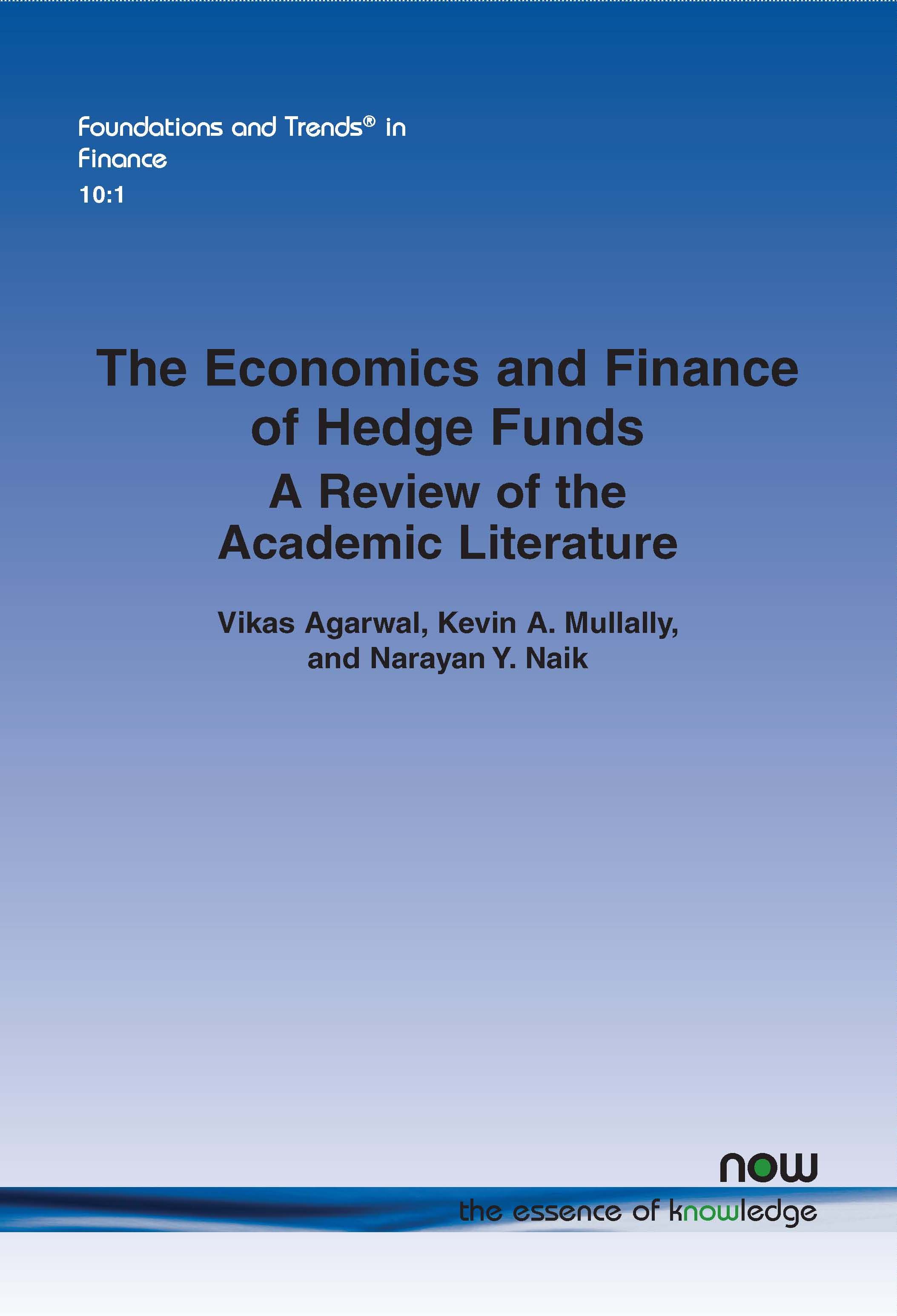The Economics and Finance of Hedge Funds: A Review of the Academic Literature
By Vikas Agarwal, Georgia State University, USA, vagarwal@gsu.edu | Kevin A. Mullally, Georgia State University, USA, kmullally1@gsu.edu | Narayan Y. Naik, London Business School, UK, nnaik@london.edu
Abstract
Hedge funds have become increasingly important players in financial markets. This heightened importance has spawned a large academic literature focused on issues pertinent to hedge fund managers, investors, regulators, and policymakers. Although the top four finance journals (the Journal of Finance, the Journal of Financial Economics, the Review of Financial Studies, and the Journal of Financial and Quantitative Analysis) published only 16 papers on hedge funds prior to 2005, they have published 105 papers on hedge funds since 2005. As a result, we felt that it is time to update the monograph published in 2005 [Agarwal and Naik, 2005]. This update, prepared with the help of new coauthor Kevin Mullally, extends the previous monograph along two dimensions. First, it includes reviews of recent studies on topics that were covered in the earlier monograph. Second, it summarizes research on new topics that were not part of the previous monograph. These new topics cover a broad gamut of issues ranging from hedge funds' use of leverage and exposure to different risks to their impact on various asset markets.
This monograph consists of five broad sections. The first section reviews the literature examining both the time-series and cross-sectional variation in hedge fund performance. Time-series performance studies cover return-generating processes, dynamic risk exposures, and determination of managerial skill. The second section covers studies focused on the cross-sectional relations between hedge funds' characteristics (including contractual features and time-varying features such as size and age) and fund performance. The third section analyzes the literature on the sources and nature of risks faced by hedge fund investors. In particular, we discuss risks that can arise from managerial incentives and sources of capital. The fourth section summarizes research on the role of hedge funds in the financial system. Specific topics here include hedge funds' impact on systemic risk, asset prices, and liquidity provision in financial markets. The fifth and final section focuses on potential biases and limitations of hedge fund data sources.
The Economics and Finance of Hedge Funds: A Review of the Academic Literature
The Economics and Finance of Hedge Funds updates an earlier review by the authors. It includes reviews of recent studies on topics that were covered in the earlier survey, and summarizes research on new topics that were not part of the previous survey. These new topics cover a broad gamut of issues, ranging from hedge funds' use of leverage and exposure to different risks to their impact on various asset markets.
The Economics and Finance of Hedge Funds consists of five broad sections. The first section reviews the literature examining both the time-series and cross-sectional variation in hedge fund performance. Time-series performance studies cover return generating processes, dynamic risk exposures, and determination of managerial skill. The second section covers studies focused on the cross-sectional relations between hedge funds' characteristics (including contractual features and time-varying features such as size and age) and fund performance. The third section analyzes the literature on the sources and nature of risks faced by hedge fund investors. In particular, the authors discuss risks that can arise from managerial incentives and sources of capital. The fourth section summarizes research on the role of hedge funds in the financial system. Specific topics here include hedge funds' impact on systemic risk, asset prices, and liquidity provision in financial markets. The fifth and final section focuses on potential biases and limitations of hedge fund data sources.

Addendum Q and A | 0500000047_Addendum.pdf
These Questions and Answers about the article The Economics and Finance of Hedge Funds are published as an addendym to V. Agarwal, K. A. Mullally, and N. Y. Naik, "The Economics and Finance of Hedge Funds: A Review of the Academic Literature," Foundations and Trends® in Finance, vol. 10, no. 1, pp. 1-111, Dec. 2015. doi: 10.1561/0500000047.
Companion
Hedge Funds
, Foundations and Trends® in Finance, Volume 1, Issue 2 10.1561/0500000002
This is the first version of this survey. The Economics and Finance of Hedge Funds is an update.